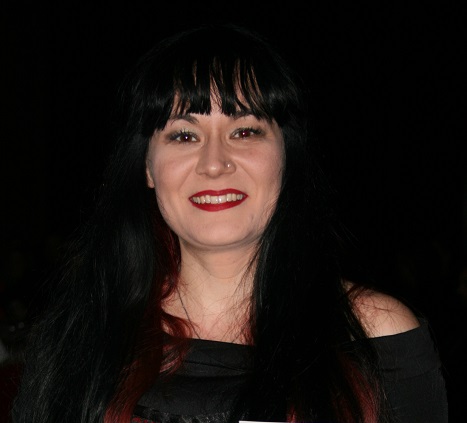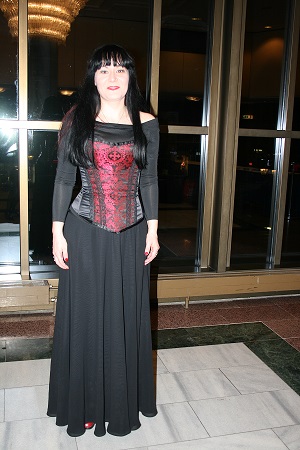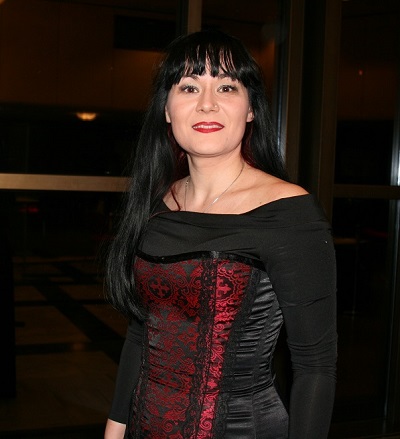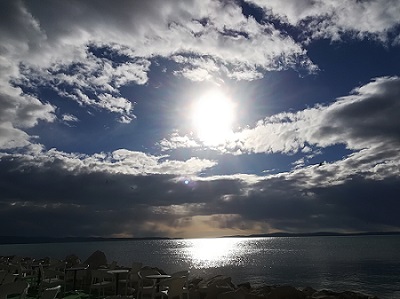
Helena Mamich (Photo: Jasna Lovrincevic)
“Through avant-garde music, I have absolutely felt my freedom of expression”, stated soprano Helena Mamich, whom I have interviewed on 27 th of March 2019 during her pause in Split between performing and rehearsals in Berlin. In October she will perform the role of Madam Butterfly (Giacomo Puccini) in Sydney and at the beginning of the year 2020, she will perform the role of Magda Sorel from Gian Carlo Menotti’s opera The Consul in Melbourne.
Helena Mamich, Canberra born medical doctor and musician, at age of five came to live in Split, Croatia, where she completed her studies in Medicine at the University of Split. She studied music at School of Music, Australian National University where she obtained Master’s degree in music performance in the class of Australian tenor Dr. Paul McMahon.
She has devoted herself to classical contemporary music repertoire. She has won the first prize at Australian Competition for Contemporary Music, New Music Art Song 2015.
As a soloist she had performed in Croatia, Italy, Germany, Estonia and France, and in the previous two years she has been regularly performing with the chamber music ensemble Arbor Vitae Trio.
Jasna Lovrinčević: “In Berlin you have been engaged at Opéra Ivre where you usually perform new composed music. Is that your first experience of singing the new, recently composed works?”
Helena Mamich: “No, I had already such experiences, but with the chamber music repertoire and art songs. It was in Australia during my undergrad. Those were composers Gerhard Stäbler, Kunsu Shim, Kyle Ghann, Calvin Bowman, and there were plenty of young composers who were preparing compositions for their exam. The main point of collaboration was that a work was performed for the first time.”
Jasna Lovrinčević: “What are the differences between your approach to a role in the opera and approach to solo songs or chamber music?”
Helena Mamich: “The differences are obvious. When one prepares an opera, a musical play on the stage, especially this sort of opera that I am now preparing in Berlin which inludes also fragments with dance, one must be a good dancer, a good singer with an ability to memorize very fast and to have a excellente rhythm. All these factors need to unite to achieve the desired result. In the chamber music, there are no movements on the stage.
However, in contemporary chamber music there is one very difficult point that many of us are not conscious of. Unlike the opera, in an avant-garde composition can be over 35 different instruments including different percussion instruments what can be very confusing. At this point anatomical section beginns, sometimes you need to work on half of bar because of its complexity. Especially the rhythm can be very complex. Therefore it is necessary, as I would like to say, to adopt microsurgical approach in avant-garde to achieve the desired result.
The avant-garde seeks the greatest accuracy because if you make the slightest mistake, it is evident, no matter how many people say it is not audible. Individuals who understand the avant-garde music will hear any mistakes. And a small mistake will become a big, cardinal error; each minimal rhythmic or melodic failure. Therefore, avant – garde chamber music is not easy. It is often underestimated in comparison to an opera, but that part of chamber music makes it quite complex.”
Jasna Lovrinčević: “Accuracy is required mostly in all music genres, isn’t it?”
Helena Mamich: “It is required everywhere, but in a work from romanticism it will not be so audible, those minor mistakes are forgiven. Avant-garde is not considered as a lovely music, we have to know it. It’s an aesthetic of uglyness. Many people who listen to it, they experience it in that way. And then, if a performer makes the smallest mistake, they become even bigger because it’s not a pretty music. The people do not see the beauty in avant-garde music, so a small mistake escalates to a big mistake. This is not just my observation, it is a remark of my colleagues who deal with that music, but also of those who are not inclined to this type of music but they listen to it for educational purpose.”
Jasna Lovrinčević: “When did you decide to pursue avant –garde music?
Helena Mamich: “During my undergraduate studies, it was a small part of the chamber music course and then I realized through this program that it was very good for me and that I could continue my master’s degree dedicated to the contemporary composers. But that little part was responsible for starting seriously with avant-garde because I have absolutely felt my freedom of expression.”
Jasna Lovrinčević: “Have you continued with the reportoire of contemporary music?”
Helena Mamich: “Everything from the twentieth century is my sphere in which I have been active. Following my studies I have been promoting these composers from the beginning of the twentieth century untill now.

Helena Mamich (Photo: Jasna Lovrincevic)
Jasna Lovrinčević: “How do you draw back the difference between the beginnings of a modern opera from the beginning of the twentieth century such as Berg and the composer of the third millennium?”
Helena Mamich: “Berg was an interesting introduction to the twentieth century. He was still under influence, I would say Tchaikovsky, but Mahler, he had fused harmony that was still very beautiful for the ear. However, all that emerged after the First World War, around 1920, 1923 and 1927, caused a sense of discomfort because the harmony was a little too condensed and because of the content itself. The background story of these works was depressed. It contained death, tragedy, illness, mental illness as a result of war, starvation, or all those horrors that occurred during that period and that’s why it caused such reactions of the audience. All this was part of the taboo, but unfortunately that is still happening today, it means we have not much changed in that matter.”
Jasna Lovrinčević: “You often sing the vocal music of Olivier Messiaen, as you mentioned in our previous interview few years ago?”
Helena Mamich: “Olivier Messiaen is a category for himself. He is just something else. He was influenced by oriental music and dances and he used to listen the birds singing in nature . By recording it on paper he created music. He had the tremendous power to harmonize birds singing. He had relied on an songbird as it was a vocal line while he harmonised the rest. Sometimes there was a situation when he composed according to several singing birds and he recorded it as a polyphony of four simultaneous lines or four voices melorythmic dictation. That was really very effective and interesting.”
Jasna Lovrinčević: “The spirituality of Olivier Messiaen is well known and you have performed his spiritual music. How difficult or easy is it for a performer to transmit all spirituality and emotions behind his music?”
Helena Mamich: “At first I have red what it is all about and then translated lyrics written in French into Croatian language. French is a beautiful language, it is very melodic and it has facilitated the situation for me. When one feels a sense of ecstasy in his songs, and its energetic charge, by singing that music you receive desire to dance because of all these asymmetrical measures, which I’m fond of. The impulses in your soul, evoked by that sense of ecstasy are unbelievable. You simply dance in your soul, but you stay calm beside the piano. Your soul dances and it is manifested on your voice being focused on it. The feeling that can be produced by this melody is incredible, you feel like a singing bird in nature.
It is one of my impressions, directly from my soul. I feel it like that. It gives me an incredible feeling of soul ecstasy because that bird was created by the beloved God, and with his music Messiaen has returned his talent to God, thanking Him for such a wonderful nature.
I feel very much inspired by Messiaen and I cannot stop admiring this composer. Discovering him as a composer was due to my lecturer from university who told me that I had a perfectly suitable voice for his music. When I have listened and tried to sing a little bit his melodies, I have been completely stunned by his music and then I have realized that my heart is in his repertoire, whether it is his instrumental or vocal music. I got intoxicated in a positive way with his instrumental music. Later I used to listen to his music during my working shift in clinic where i used to work. This had been for educational and therapeutic reasons. It was a dual effect.
When I listen Messiaen’ Improvisations on the organ, recorded by himself, I could sense those moments when he was in a fusion with some supernatural; In those momoment it looks like his soul, mind, and body were floating in paradise. His fingers and a pedal might have been glued to that organ, but he was somewere else, in some other sphere.
He was so inspired by something supernatural what we as a human species can not perceive it. Evidently he had received some gift which he converted into music so that we could also experienced it.”
Jasna Lovrinčević: “You have recognised that in his interpretation and in his music, but it is hard to expect that all of performers to be so convincing.”
Helena Mamich: “I’m pleased that I have found his music very interesting, and that I gladly return to listen and learn his vocal reportoire. It is a great pleasure to me to find all of his vocal opuses – his music is an excellent exercise for the brain.”

Helena Mamich (Photo: Jasna Lovrincevic)
Jasna Lovrinčević: “In Melbourne you will perform the role of Magda Sorel from the opera The Consul by Gian Carl Menotti. The libretto of The Consul is gloomy like most of the operas by Alban Berg. It is about imigration, one of very actual themes today.”
Helena Mamich: “I have been choosen by that opera.Through the main character of Magda Sorel I have seen the struggle of my parents. My parents found themselves almost in the same situation as Magda Sorel. They emigrated from former Yugoslavia very young because of unpleasant factors. They were looking for a better life in Australia. Long-lasting oppression in our homeland unfortunately has forced many people to go out of the country.
I can connect The Consul with exodus of that time, but of course also with the struggle of those people for their rights in the sea of bureaucracy which is unpleasnt in every foreign country. These problems do not last for a month, but for a year or more. They create a serious sense bitterness.
But when it all terminates, we ask those who work in bureaucracy when will they become human beings and be able to feel what we feel. One day it will be a situation when we will be free from that horrific sense, but then it comes to my mind regarding the question, if there is a refuge for a man who has died across the border. Considering all of this, I could make the regie for The Consul because I can absolutely understand Magda Sorel. She was a very young woman whose soul had aged very quickly. She was in an extremely desperate situation. She fought. We have lot of Magda Sorel. Magda Sorel is the mother of many of us who have emigrated. The mothers like Magda Sorel have made the first breakthrough and have raised their children in other countries, desiring a better life for them. They have not liked to live under the opression of the regimes which destroyed them, and not just them, but also their children and their grandchildren. They just had good intentions.”
Jasna Lovrinčević: “It is interesting that you, with similar experience of your parents have been selected for this role? You also have been forced to seek a job abroad as a medical doctor!”
Helena Mamich: “That is so interesting. I have not looked for that role, she has found me. This is something like destiny. It has found me because I have an important message to convey to my audience. I will, through the image of Magda Sorel, revive all the mothers who have been migrated with their children. I have migrated to Germany because of similar situation. Maybe I am Magda Sorel too, who struggles with that bureaucracy, and who has fought with a corrupt system that I have abandoned with a hope for a better and happier time. Perhaps, with my example, I could show that it might be possible to break this sad cycle of Magda Sorel. My mother says “never,” but I say, probably there is hope.”

Split (Photo: Helena Mamich)
Jasna Lovrinčević: “This is a libretto, dramatic part, and what is your opinion about the music part of The Consul opera?”
Helena Mamich: “I can honestly say Magda Sorel is the best choice for my type of voice. Menotti was sesitive to singers’ needs. Menontti hasn’t written a big number of tones on the passaggio part. They are few of them, but they are set in a logical way that is not taxing for the voice. Menotti demands a very good singing technique and all other vocal elements. In this case it is not tiring to sing his works. It suits me to sing Menotti as I have a darker vocal timbre and currently my vocal fach is a young dramatic soprano.”
Jasna Lovrinčević: “When will be The Consul performed and where?”
Helena Mamich: “In February, 2020, at the Culture Center in Melbourne. This is an independent project of our fellow colleagues who were together at University and several contract singers from the Melbourne Opera. We are all over the world with Australia connecting us.”
